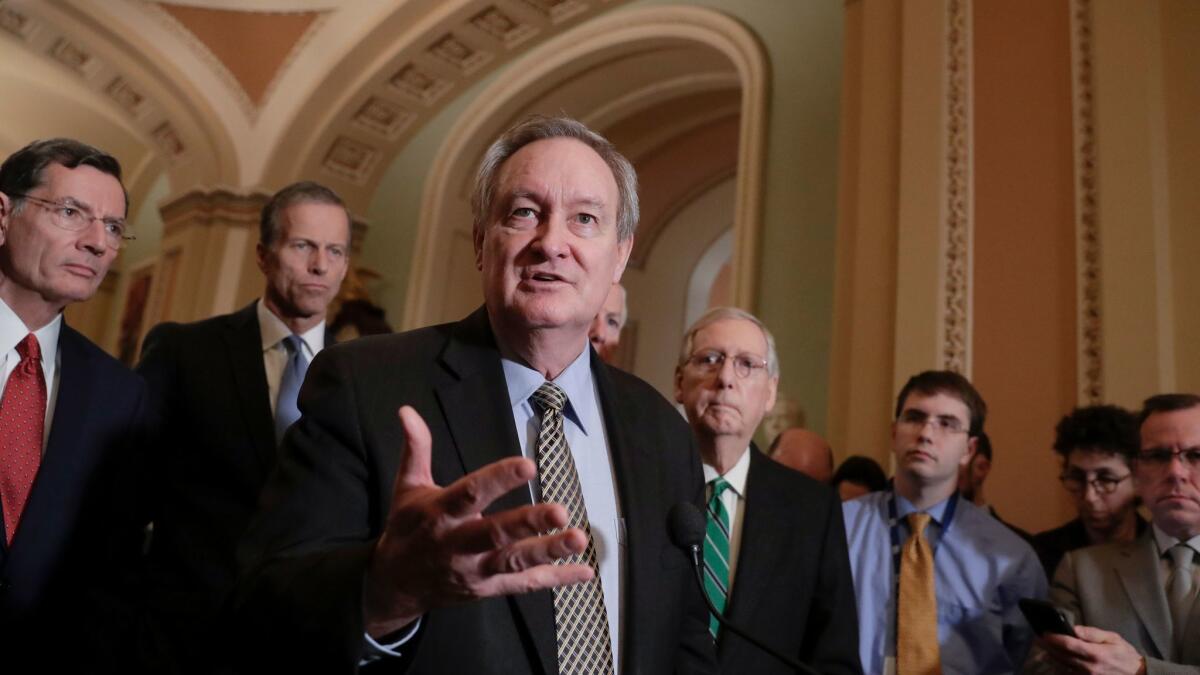Lawmakers revise financial deregulation bill to try to blunt criticisms and assure House passage

- Share via
Reporting from Washington — Senators pushing legislation to roll back banking regulations instituted after the financial crisis are proposing changes to try to blunt liberal criticisms — and adding provisions for conservatives to assure House passage.
The bipartisan bill is focused on easing burdens on community and midsized banks put in place by the 2010 Dodd-Frank Wall Street Reform and Consumer Protection Act.
While there’s broad support for that goal, the legislation being considered by the Senate this week also would help larger financial institutions, including huge foreign banks. That has drawn fire from Sen. Elizabeth Warren (D-Mass.) and other liberals.
The bill, sponsored by Senate Banking Committee Chairman Mike Crapo (R-Idaho), would raise the threshold for so-called systemically important financial institutions, which face mandatory and rigorous annual stress tests and other heightened oversight, to $250 billion in assets from the current $50-billion level.
That could provide significant relief for large firms such as State Street Corp., BB&T Corp. and Suntrust Banks Inc.
The bill also could offer a regulatory break for giant foreign banks, including Credit Suisse, Deutsche Bank and BNP Paribas, because their U.S. affiliates have less than $250 billion in assets, even though they are part of global operations that are well above that threshold.
Those and other foreign banks have a history of problems that have led to major fines or settlements with the Justice Department in recent years.
“This legislation weakens oversight of foreign banks operating in the United States, many of which have a track record of breaking U.S. laws,” said Sen. Sherrod Brown (D-Ohio).
Crapo and other bill supporters, which include a dozen Democratic co-sponsors, said the bill would not reduce oversight of those banks. They pointed to testimony by Federal Reserve Chairman Jerome H. Powell last week that regulators consider a foreign bank’s total global assets in deciding how much oversight its U.S. operation should get.
But Brown noted that Treasury Secretary Steven T. Mnuchin testified to the Senate Banking Committee in January that the bill would reduce regulation on foreign banks whose U.S. assets are below $250 billion. And former Federal Reserve Gov. Dan Tarullo, who oversaw the central bank’s regulatory efforts for several years before resigning in 2017, said in a letter to Crapo and Brown that the provision was ambiguous and needed to be clarified.
Crapo attempted to do that in a package of amendments introduced Wednesday night after discussions with the bill’s co-sponsors. One change specifies that nothing in the bill should be construed as affecting the Fed’s rules for foreign bank oversight.
Brown said that wasn’t good enough because it gives the Fed too much discretion to ease oversight of U.S. operations of huge foreign banks.
“The provision provides some vague, ambiguous language that puts the question to the Fed: You can regulate the foreign banks or not, it’s your choice,” Brown said Thursday.
“The legislation doesn’t require the Fed to keep the strong rules that are currently in place, and it doesn’t stop the foreign banks from suing if the Fed doesn’t obey their requests,” he said.
Brown said he wants the bill amended to specify that there be “no favors for the biggest global banks operating here in the United States.”
Crapo’s package of proposed amendments is designed to make technical fixes but also to add some provisions that could ensure passage by the House.
House Republicans last year approved a much more sweeping overhaul of Dodd-Frank, which conservatives have complained has restricted access to capital.
But to get the bipartisan support needed for legislation to pass the Senate, Crapo had to shepherd a more modest package that avoided some of the House’s more extreme moves, such as gutting the authority of the Consumer Financial Protection Bureau.
Crapo’s bill doesn’t make any major changes to that agency, which was created by Dodd-Frank.
The revisions to the Senate legislation include some provisions designed to lure House support. They include adding a House-passed bill that would loosen some rules on high-volatility commercial real estate. The change, sought by smaller community banks and regional banks, would revise requirements that they hold more capital for those loans by exempting loans in which borrowers also contribute some resources, land, or property as part of the deal.
“This is a clear effort to buy support from the House,” Jaret Seiberg, an analyst with brokerage and investment bank Cowen & Co., wrote in a research note Thursday. “It contains several new provisions that the House either has passed or has been considering.”
Crapo’s package of changes is likely to be approved as the Senate heads toward expected passage of the bill next week.
Other senators have amendments that are unlikely to pass. Warren has proposed 17 amendments toughening the bill, including preventing any bank that received more than $1 billion in bailout money or was fined more than $10 million over the last decade from getting reduced federal oversight.
Twitter: @JimPuzzanghera
More to Read
Inside the business of entertainment
The Wide Shot brings you news, analysis and insights on everything from streaming wars to production — and what it all means for the future.
You may occasionally receive promotional content from the Los Angeles Times.











